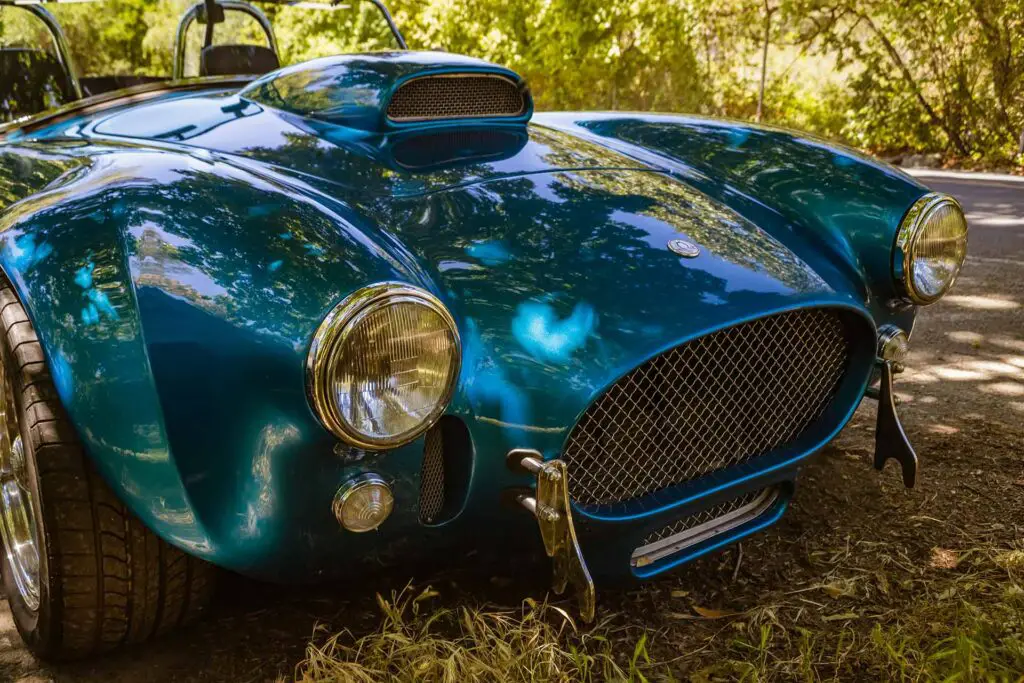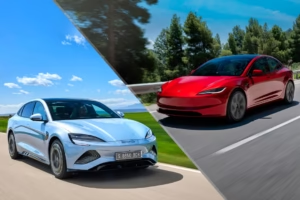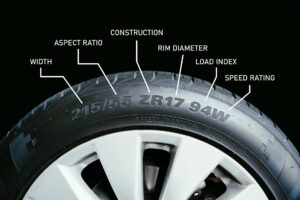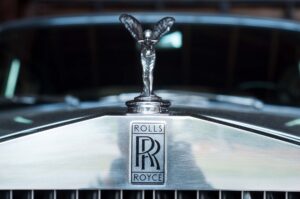The allure of the most expensive cars sold at auction lies in their unmatched rarity, history, and craftsmanship. Did you know the 1955 Mercedes-Benz 300 SLR Uhlenhaut Coupe holds the record at $142 million, according to Sotheby’s? These rides are special because they are rolling pieces of history commanding jaw-dropping sums.
The Legends of the Auction Block – Top 10 Most Expensive Cars Sold at Auction
The auction world has seen some of the most iconic and historic four-wheelers cross the block for staggering sums. From race-winning legends to timeless works of art on wheels, these vehicles represent the pinnacle of automotive design and engineering. Let’s explore the top 10 most expensive cars ever sold at auction and the stories behind their record-breaking prices.
1. 1955 Mercedes-Benz 300 SLR Uhlenhaut Coupe – $142 Million
This Mercedes-Benz set the record as the most expensive car ever sold at auction, auctioned for $142 million in 2022. With only two ever built, it is a masterpiece of engineering and design, tied to Mercedes’ legendary engineer Rudolf Uhlenhaut.
2. 1962 Ferrari 330 LM / 250 GTO – $51.7 Million
Ferrari’s crown jewel, this 250 GTO model, sold in 2023 for $51.7 million. Its racing success and exclusivity – only 36 units were ever produced – make it one of the most coveted cars in history.
3. 1962 Ferrari 250 GTO – $48.4 Million
Another 250 GTO broke records in 2018 when it fetched $48.4 million. Known for its beauty and performance, it is the quintessential collectible for Ferrari fans.
4. 1957 Ferrari 335 Sport Scaglietti – $35.7 Million
Auctioned in 2016, this Ferrari is steeped in racing history, including a near-win at the 1957 Le Mans. Its sleek design and storied past captivated bidders.
5. 1954 Mercedes-Benz W196R – $29.6 Million
This Formula One car, driven by the great Juan Manuel Fangio, fetched $29.6 million in 2013. It remains a symbol of Mercedes-Benz’s dominance in mid-century motorsport.
6. 1964 Ferrari 275 GTB/C Speciale by Scaglietti – $26.4 Million
Built to compete in the 24 Hours of Le Mans, this Ferrari sold for $26.4 million in 2014. It is one of only three ever made, designed for racing and performance perfection.
7. 1956 Aston Martin DBR1 – $22.5 Million
A racing legend, this DBR1 sold for $22.5 million in 2017. It remains Aston Martin’s most significant race car, with a victory at the 1959 24 Hours of Le Mans.
8. 1955 Jaguar D-Type – $21.8 Million
This Jaguar’s aerodynamic design and racing success, including three Le Mans wins, earned it $21.8 million in 2016. It’s a ride that represents Jaguar’s golden era.
9. 1935 Duesenberg SSJ – $22 Million
This pre-war masterpiece, owned by Hollywood legends, fetched $22 million in 2018. It combines luxury, performance, and a touch of old Hollywood glamour.
10. 1962 Shelby Cobra CSX2000 – $13.75 MILLION
The first Shelby Cobra, chassis CSX2000, sold for a record $13.75 million. Painted in different colors to mimic production, this untouched icon, with its dents and mismatched paint, remains one of the most expensive American cars sold at auction, showcasing Shelby’s ingenuity and legacy.

Most Expensive Car Sold at Auction – Honorable Mentions
While the cars on this top 10 list dominate the headlines, they’re far from the only jaw-dropping vehicles to command enormous sums at auction. Some four-wheelers, while just outside the top-tier rankings, still stand as symbols of automotive artistry, engineering brilliance, and storied legacies. These honorable mentions embody the passion and dedication that define the world of classic car collecting.
1964 FORD GT40 PROTOTYPE – $7 MILLION
The 1964 Ford GT40 Prototype, chassis GT/105, is a significant piece of automotive history. As the fifth of the original GT40 prototypes built in Coventry, England, it played a crucial role in Ford’s quest to dominate endurance racing, particularly the 24 Hours of Le Mans. This prototype was equipped with a 4.2-liter V8 engine and served as a testbed for the advancements that led to Ford’s later successes at Le Mans. In 2014, this iconic vehicle was auctioned for a remarkable $7 million, underscoring its historical importance and desirability among collectors.
1967 CORVETTE L88S COUPE – $3.85 MILLION
The 1967 Chevrolet Corvette L88 is among the rarest and most coveted Corvettes ever produced, with only 20 units built that year. Designed for performance, the L88 package included a powerful 427 cubic-inch V8 engine, conservatively rated at 430 horsepower but believed to produce significantly more. This model was engineered for the racetrack, with features like aluminum heads, a high-performance suspension, and the absence of a radio or heater to reduce weight. In 2014, a 1967 Corvette L88 Coupe fetched $3.5 million at auction, reflecting its rarity and significance in automotive history.
1971 HEMI ‘CUDA CONVERTIBLE – $3.5 MILLION
The 1971 Plymouth Hemi ‘Cuda Convertible is a rare gem in the muscle car world, with only 11 units produced that year. Equipped with a 426 Hemi V8 engine and a 4-speed manual transmission, this model was built for high performance. Its rarity and desirability have made it a star at auctions. In June 2014, a well-preserved example sold for $3.5 million, making it one of the most expensive Plymouth convertibles ever auctioned.
Tips for Collectors Interested in Rare Cars
Joining the exclusive club of classic car collectors isn’t just about having deep pockets – it’s about passion, knowledge, and a well-thought-out strategy. Whether you’re a seasoned buyer or just starting your collection, these tips can help you navigate the intricate world of rare and collectible automobiles.
Do Your Research
Buying a classic car isn’t something you dive into without doing your homework. Every car has a story, and it’s your job to uncover it. Dig into the car’s past – how many were made, who’s owned it, and whether it has a racing pedigree. Rides tied to celebrities or iconic events tend to fetch higher prices for a reason. Keep an eye on market trends too. Knowing which models are gaining value can guide your decision. And, of course, always confirm the car’s authenticity with proper documentation and expert advice – you don’t want to spend big on a vehicle with a questionable past.
Work With Experts
Even if you’re a car enthusiast, navigating the world of classic cars can feel overwhelming. This is where experts can save the day. Auction houses not only give you access to incredible finds but also help you understand the car’s worth. A vintage car appraiser can provide peace of mind, ensuring you’re getting what you pay for. And don’t forget to involve a good mechanic who knows their way around classic cars. They can spot hidden problems that might cost you a fortune later.
Set a Budget
Let’s face it: owning a classic car isn’t just about the thrill of driving it – it’s also a financial commitment. Set a budget before you even think about bidding, so you don’t get carried away. Beyond the auction price, think about maintenance, which often involves expensive parts and skilled labor. Insurance is another factor; collectible cars usually come with higher premiums. Plan for all these costs upfront, and you’ll save yourself a lot of stress down the road.
Plan for Storage
Once you’ve bought your dream car, you’ll need a proper home for it. Classic cars need more than a regular garage—they need climate control to protect them from humidity and temperature changes that can wreak havoc on paint and upholstery. Security is just as important, with alarms and cameras helping to keep your investment safe. Even if the car isn’t on the road often, starting it up regularly and checking fluids can prevent costly damage over time.
Network With Other Collectors
One of the best parts of owning a classic car is the community that comes with it. Connecting with other collectors can give you invaluable tips, insights, and maybe even leads on your next dream car. Attend car shows and club events to meet fellow enthusiasts, or join online forums to share stories and advice. You’ll quickly find that the people in this world are as passionate as you are.
Think Long-Term
Classic cars are more than just fun toys – they’re investments that require patience. Some four-wheelers appreciate quickly, while others hold their value over time. Keeping detailed records of your car’s history, maintenance, and restoration can boost its worth when it’s time to sell. And don’t rush into a purchase; the perfect vehicle at the right price is always worth the wait. With the right approach, your classic car can bring both joy and smart returns.
What’s Next for Classic Car Auctions?
The world of classic car auctions is poised for an exciting future, blending nostalgia with innovation. As interest in automotive history continues to grow, so does the appetite for rare and iconic vehicles. Record-breaking sales are expected to remain a hallmark of the industry, driven by a new generation of collectors eager to own a piece of history.
The collector demographic is shifting, with younger buyers gravitating toward four-wheelers that resonate with their era, like 1980s supercars and early electric models. Technology is also reshaping auctions, making them more accessible through online platforms and enhancing transparency with blockchain for provenance tracking. As modern manufacturing becomes more automated, collectors value the craftsmanship and individuality of classic cars even more.
This growing interest is driving record-breaking sales, particularly for vehicles with historical significance or cultural ties. With soaring prices, authenticity and preservation are increasingly prioritized, with original, untouched rides commanding the highest demand.

Driving Into the Sunset – Why These Four-Wheelers Matter
The vehicles on this list represent more than wealth – they’re milestones of engineering, design, and history. Whether they’re breaking speed records on the track or smashing auction records, these vehicles are symbols of human ingenuity and passion.
As auctions evolve, one thing remains clear: the allure of owning a piece of history will never fade. And for those looking to enter this exhilarating world, there’s always another classic car waiting to be discovered.








